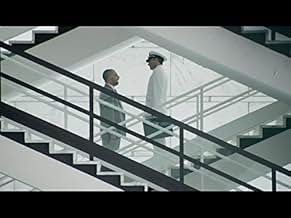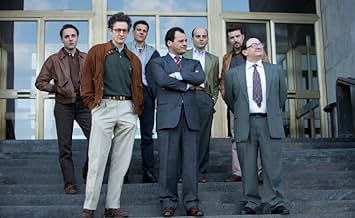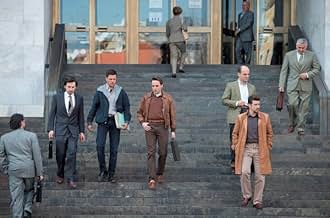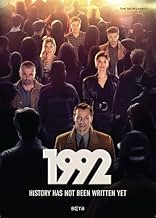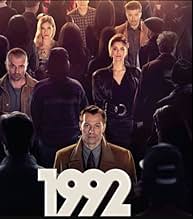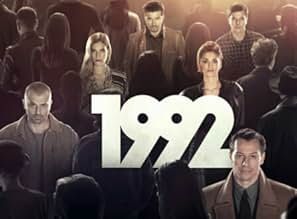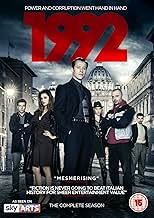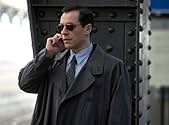1992
- Série télévisée
- 2015
Ajouter une intrigue dans votre langueFollows six people whose lives are intertwined with the rapidly changing political landscape of early 90's Italy.Follows six people whose lives are intertwined with the rapidly changing political landscape of early 90's Italy.Follows six people whose lives are intertwined with the rapidly changing political landscape of early 90's Italy.
- Récompenses
- 1 nomination au total
Parcourir les épisodes
Histoire
Le saviez-vous
- AnecdotesMain actors Miriam Leone, Guido Caprino and Tea Falco all come from Sicily and had to act with a north-Italian accent.
- ConnexionsFollowed by 1993 (2017)
Commentaire à la une
Here we have a wonderfully written and produced historical fiction based on events occurring in Italy (mainly) during the '90ies (this is meant to be the first season covering the year 1992). It's a pity I didn't watch it 2 years ago when it was originally released: 2 years is a lot of things watched meanwhile and I might have enjoyed it even more.
In 1992 I was 13 like the protagonist's daughter. Possibly I remember much more of that year, its vibe, people's bafflement and reactions, than most non-historians adults. Then, various cultural dynamics heavily fighting unlawful conducts matured and gained power; peculiar loathing was raised by the standard corruptive practices in politics. This resulted in a period of political instability (or irrelevance?) that hasn't actually ended yet (but that's debatable). Perhaps the major effect was the influence on the new generations' perspective: more disillusioned, and - if not more honest - at least less dumb. And still victims of yet other fairy tales: the show business, liberalism and various forms of populism.
While in today's connected world these events might seem unimportant, they represented an overwhelming wake-up call for the people of one of the major economies of the planet (like Italy was in the 90ies). And portrayed in this fashion they truly shine. Many lines, scenes and acting moments are brilliant in their gritty cynicism, evocative glamour or punching irony.
Nonetheless we have a volatile screenplay as well: mostly it's incredibly vivid but throughout the series we have also a bit too many in-depth romantic relationships, anguish-squeezing drama and trite situations. Above all: too many tight links among the fictitious/historic protagonists. They meet and influence the core story-line; then they leave each other; then they meet again and change the story again. And this happens multiple times for all the main characters: a bit too much to be believable. Writers could have given some space to other actors without generating the natural skepticism that occurs when "history worthy" things happen but no real history book talks about our fictional protagonists: is it likely?
A couple of things nearly kept me from giving the series a full 9 (i.e. like Tea Falco's delivery, Accorsi's "too cool" character, or a populist congressman and a starlet having public-sex in central Rome: a little too much beyond belief...) but overall it's just nitpicking (and actually Accorsi carries every scene he's in).
International appeal is a possible concern though: the story-line is very complex, with a lot of different real-life people involved about whom you can hardly find anything online which is not in Italian. So any attempt to give substance and depth to what non-Italian audiences are watching might easily fail. And this could ultimately result in a parade of politicians, bureaucrats, businessmen, etc etc you don't know and care about.
Given this caveat, 1992 is surely one of the best recent historic-drama series worldwide; so good it could well be used to entertain and still inspire bored high-schoolers towards serious history research.
In 1992 I was 13 like the protagonist's daughter. Possibly I remember much more of that year, its vibe, people's bafflement and reactions, than most non-historians adults. Then, various cultural dynamics heavily fighting unlawful conducts matured and gained power; peculiar loathing was raised by the standard corruptive practices in politics. This resulted in a period of political instability (or irrelevance?) that hasn't actually ended yet (but that's debatable). Perhaps the major effect was the influence on the new generations' perspective: more disillusioned, and - if not more honest - at least less dumb. And still victims of yet other fairy tales: the show business, liberalism and various forms of populism.
While in today's connected world these events might seem unimportant, they represented an overwhelming wake-up call for the people of one of the major economies of the planet (like Italy was in the 90ies). And portrayed in this fashion they truly shine. Many lines, scenes and acting moments are brilliant in their gritty cynicism, evocative glamour or punching irony.
Nonetheless we have a volatile screenplay as well: mostly it's incredibly vivid but throughout the series we have also a bit too many in-depth romantic relationships, anguish-squeezing drama and trite situations. Above all: too many tight links among the fictitious/historic protagonists. They meet and influence the core story-line; then they leave each other; then they meet again and change the story again. And this happens multiple times for all the main characters: a bit too much to be believable. Writers could have given some space to other actors without generating the natural skepticism that occurs when "history worthy" things happen but no real history book talks about our fictional protagonists: is it likely?
A couple of things nearly kept me from giving the series a full 9 (i.e. like Tea Falco's delivery, Accorsi's "too cool" character, or a populist congressman and a starlet having public-sex in central Rome: a little too much beyond belief...) but overall it's just nitpicking (and actually Accorsi carries every scene he's in).
International appeal is a possible concern though: the story-line is very complex, with a lot of different real-life people involved about whom you can hardly find anything online which is not in Italian. So any attempt to give substance and depth to what non-Italian audiences are watching might easily fail. And this could ultimately result in a parade of politicians, bureaucrats, businessmen, etc etc you don't know and care about.
Given this caveat, 1992 is surely one of the best recent historic-drama series worldwide; so good it could well be used to entertain and still inspire bored high-schoolers towards serious history research.
Meilleurs choix
Connectez-vous pour évaluer et suivre la liste de favoris afin de recevoir des recommandations personnalisées
- How many seasons does 1992 have?Alimenté par Alexa
Détails
- Couleur
- Mixage
- Rapport de forme
- 2.35 : 1
Contribuer à cette page
Suggérer une modification ou ajouter du contenu manquant


